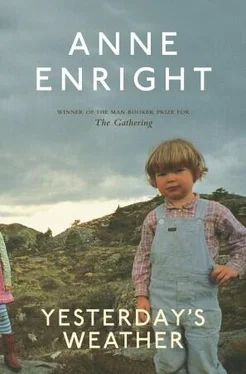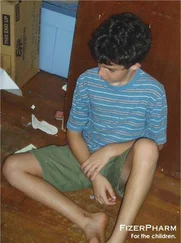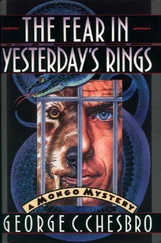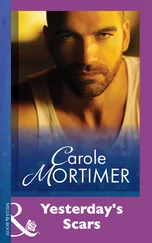‘Sorry,’ she said.
‘So that’s why — you know?’
‘I’m sorry.’
He asked did she have a brother called Kevin Daly, or a cousin, and she just said, ‘No, sorry.’ But he was quite insistent, as though she might be harbouring the man. ‘No, really, I’m sorry,’ she said, and put down the phone.
The next day, Kitty expected someone to float down the escalator into the bed department and call her by name. She did not know who it might be, or how they might be dressed. A girl, maybe, with green eyes, or a slender young boy. She imagined a man in a perfect black suit — something extra about him, anyway, like Cary Grant. A young man with curly red hair gazed at her — or through her — all the way from the floor above and she wondered, bizarrely, if he might be the person she was waiting for. Also, what he might say to her, if he was.
Then a figure did appear that made her heart turn, and it took a while before Kitty realised it was her own mother, sailing down from fabrics and soft furnishings like a queen.
‘I didn’t recognise you,’ Kitty said.
Her mother was in town looking for a shower curtain and thought she would pop in to say hello. But after that, there was little enough to talk about. Kitty was used to seeing her at home: out in the open, she seemed surprisingly well dressed and mute.
‘Well, you always know where to find me,’ Kitty said to her, with a stranger’s smile.
Kitty ended up seducing a man from the local drama society, a little to his surprise. He had been courting her for months, but in an old-fashioned sort of way. He was sixty-plus and Kitty was forty-plus, but that was the kind of age gap you could expect, with two nearly grown sons. They were both in a production of Johnny Belinda , a play about a deaf mute who gets pregnant, though it comes out right in the end. Kitty did the interval coffees and had a walk-on in the final scene. Tom, for that was the man’s name, did the set. He was good with his hands, he said, as he bent over a saw-horse in the scene dock, and Kitty flicked a glance at him to see what he meant — but all he meant was that he was good at making things. Nice. In a way. He drove her home after rehearsal most nights, and one evening they stopped out to eat. After which, Kitty asked him in for a drink.
Tom. He said all he needed was a couple of hours to fit two dimmers where the old light switch was, but she’d need to redecorate, after. He looked at the photos on her mantelpiece. He was recently bereaved. His daughter had told him to join the drama society, so there he was. In a moment, Kitty thought, he would tell her about his teeth, that they were all his own. Faded brown eyes, silver hair, a handsome where-did-it-all-go-wrong face. They were safe enough. Kitty’s eldest lumbered in from the pub, and stayed to be introduced. Her youngest was upstairs with his own TV. They were nice boys. They did not expect their mother to seduce old geezers in the front room, and neither did the geezer. It was awkward all the way through, and quite satisfying. Kitty did not tell him about her ex-husband, as he did not talk about his dead wife. She did not tell him that her husband had strayed, that she had done everything to keep him — up to, and including, porn videos in the bedroom — and that when she stormed out, the judge had held that desertion against her and awarded him the house. She did not tell him how her husband moved a woman in two weeks after they walked out of court, how the boys had followed her finally to her bedsit and looked after her, as only young boys can, how together they had made their way here, to the outer suburbs and a decent life. Nor did she tell him that she was pregnant, when she realised that she was pregnant. She just let him, and the drama society, lapse, soon after the curtain had rung down on Johnny Belinda , and before anyone could be surprised.
At first she thought it was the change of life. She stood in the bed department and waited for hot flashes. She did not mind growing old as long as it meant growing easy, but it did not seem to be working out that way. There was an agitation, a turbulence in her blood. She rode all the way up to accounts to query her payslip, and she landed back down in the bed department with a thump. She walked the floor and sat on the beds. She had a terrible need to lie down on one of them. One Monday evening during stocktaking, she actually did lie down. She simply reclined. She let her back sink into a double-sprung Slumberland, and felt she might never rise again.
It was not until she bought three pots of apricot jam that the penny dropped. She did not even bother to take a test. She felt that swooping blankness she had felt with each of the boys, so delicious, like diving into a pool and finding you could breathe. The child was no bigger than a pip in the flesh of her stomach. She took it for walks and little outings. She gave it a go on the escalators and on a park swing, scuffing the coarse sand under her feet and feeling a little mad. What would she tell the boys? As for the people in the bed department — Jackie, who shared the floor with her, and the customers who came in to look or buy — they all looked empty to her, like husks. As though she were the only real thing left. It was like that film with the pods, and she wanted to run away somewhere, to a deserted lighthouse, or a shack by the beach, and sit in a shaft of light while her baby grew.
Tom rang. His voice was a shock.
‘I just thought I’d check up on you.’ He sounded close, he sounded right inside her ear. Kitty had to remind herself that there were miles of cable between them, a maze of electricity and static.
‘I’m fine,’ she said. ‘How are things?’
‘Good. Good.’
In the pause, she felt sorry for him. He wasn’t used to this kind of thing.
‘And yourself?’ he said.
‘Oh, flying,’ she said. ‘Flying form.’ And he took the hint and let it go.
Then one morning the down elevator sighed and stopped. People clumped down the steps carefully, almost aslant, squinting at the lines that were strangely solid, though they still seemed to shift beneath their feet. Kitty was glad she wasn’t on the thing when it ground to a halt. It would make you look so foolish. As it happened, the escalators had been empty apart from a young woman on the other side, who seemed to surge suddenly up. Whoosh.
Kitty knew it didn’t mean anything, but she feared for her baby, that was now just eleven weeks old. She could not bear the lopsided sight of the stalled steps, like someone endlessly limping at the other end of the shop floor. She took a very long lunch and when she came back a man had taken the panel off the bottom of the broken side. She was right about the chain — there it was, looping around the steps that were wedges, actually, when you looked at them side-on. They packed around the central pivot like big slices of metal pie, then separated out on the way up, dangling their triangular bases into space.
The escalator man glanced at her as she stared into the works, and then went back to his phase tester, tipping the metal gently here and there. He had hair on the backs of his hands, fine and light: one of those big, furry men with cushioned muscles and uncertain eyes. Kitty stood for a long time, making him uneasy. He glanced over his shoulder again, but he did not really see her — which was fine.
Kitty lost the baby at thirteen weeks, or lost something, at any rate. She looked at the blood on the wad of toilet paper and wondered if it was the change of life, after all. Perhaps she had imagined the baby, perhaps it had never been there in the first place. She called in sick and went to bed and could not cry.
At the weekend she drove her youngest to his soccer game in the Phoenix Park. She had to park a distance away, because he was embarrassed by the car. Also, he did not like having his mother on the sidelines any more, so Kitty, amused, went for a walk instead. She thought she might look for the deer. And almost as she thought it, there they were, a herd of does and their fawns, standing or lying, and all of them chewing; watching, as she now watched, a pair of children and their toy plane buzzing at the other end of the glen.
Читать дальше












